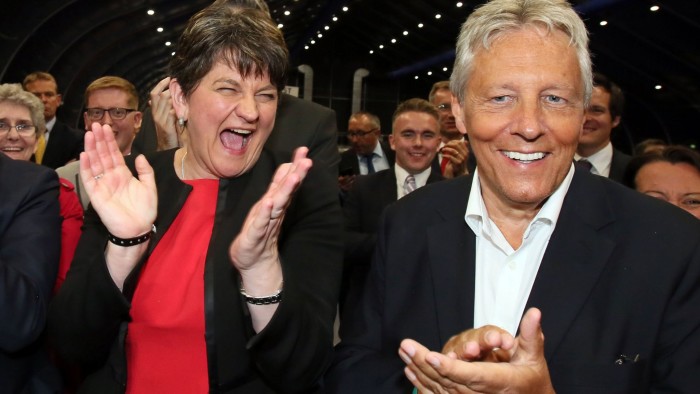It will be ‘difficult’ for May to survive, says N Ireland’s DUP

Roula Khalaf, Editor of the FT, selects her favourite stories in this weekly newsletter.
Arlene Foster, leader of Northern Ireland’s Democratic Unionist party, has said it will be “difficult” for Theresa May to survive as UK prime minister. The 10 seats the DUP won in Thursday’s general election could be critical in Mrs May’s efforts to form a coalition or seek support for a minority administration to stay in government.
The DUP and Sinn Féin have crushed their smaller and more centrist political rivals, with the election result in Northern Ireland showing a sharp swing to the more hardline proponents of unionism and nationalism.
In a BBC interview, Ms Foster said: “It will be difficult for [Mrs May] to survive given that she was presumed at the start of the campaign . . . to come back with maybe 100, maybe more, in terms of her majority.”
The surge in support for the DUP and Sinn Féin is likely to deepen the divide that has long characterised politics in Northern Ireland, and exposes a widening gulf between them on Brexit.
A big rise in support for the DUP among unionist voters was a vindication of the party’s campaign message that the general election was about “the union that really matters — the union with the UK”.
“It’s a good night for the DUP, and a great night for the union,” said Ms Foster, the party’s leader, as she arrived at the count centre in Belfast early on Friday morning.

The party’s 10 seats — a gain of two from the 2015 general election — mean the DUP, which is closely aligned to the rightwing of the Conservative party and was a vocal backer of Brexit, could be a key player in post-election haggling at Westminster.
The party said it was “too soon” to say how the DUP would handle any coalition negotiations. “There will be contact made over the weekend, but it is too soon to work out what we are going to do,” Ms Foster said.
Peter Robinson, a former DUP leader and former Northern Ireland first minister, said the party would “play a very responsible role” at Westminster. “We will be looking for the very best deal for Northern Ireland,” he told the BBC.
Sinn Féin won seven seats, three more than it did in 2015, as it consolidated its position as a forceful anti-Brexit party. In the most dramatic result of the night, the Irish republican party won Foyle — which mainly comprises the city of Londonderry — by just 169 votes, taking the seat from the moderate nationalist Social Democratic and Labour party.
Foyle was once held by John Hume, the veteran Northern Ireland politician, former SDLP leader and co-architect of the Good Friday Agreement.
The SDLP was wiped out at Westminster in the election, losing all three of its seats, two of them to Sinn Féin.
Sinn Féin does not recognise the jurisdiction of the Westminster parliament over Northern Ireland and does not take its seats. Gerry Adams, the party’s president, said there was “no question whatsoever” of the party abandoning that policy of abstention.
Comments